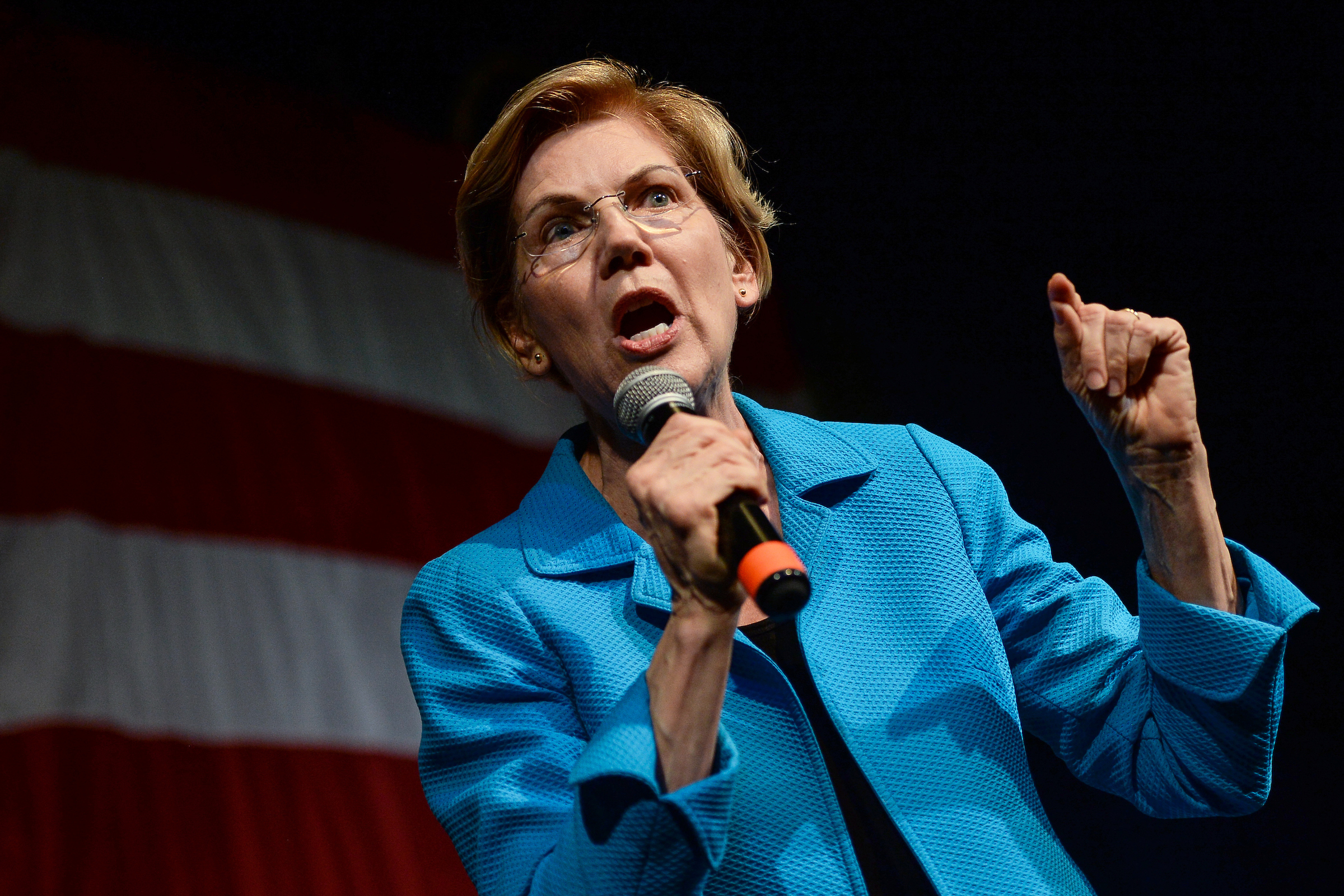Elizabeth Warren’s lobby tax may not hold up to legal scrutiny
Massachusetts Democrat’s proposals take aim at what she dubs “excessive” lobbying

If Sen. Elizabeth Warren’s long-shot tax on big K Street lobbying tabs were to make it into law, the measure would face legal challenges and is widely seen more as a political platform than an actual policy.
The Massachusetts Democrat’s presidential campaign has unveiled broad proposals to curb what she has dubbed “excessive” lobbying, including a hefty tax on companies, trade associations and other groups that spend more than $500,000 per year on federal lobbying.
As Warren’s campaign has released new details of her proposals, legal experts, scholars, lobbyists and activists disagree on whether her plans might run afoul of the First Amendment, which enshrined citizens’ rights to petition the government for a “redress of grievances.”
Courts have long upheld limited restrictions on and disclosures of lobbying campaigns. For example, lawmakers and governmental employees who’ve recently left regularly face cooling-off periods when they aren’t permitted to lobby. The taxes on lobbying that Warren’s campaign has proposed would not expressly prevent companies from lobbying but would impose a fee to deter such behavior.
“My new lobbying tax will make hiring armies of lobbyists significantly more expensive for the largest corporate influencers,” Warren states on her campaign website, describing the plan. “Sure, this may mean that some corporations and industry groups will choose to reduce their lobbying expenditures, raising less tax revenue down the road — but in that case, all the better.”
Experts on lobbying laws and the First Amendment say that makes it clear that Warren hopes to limit a company’s ability to seek a redress of grievances.
“I do think this would be very hard to defend because it infringes on such a fundamental right,” said William Minor, a partner at DLA Piper, who focuses on lobbying, campaign finance and government ethics laws. “This more clearly seeks to limit what you do rather than simply shed light into it.”
Warren has proposed a 35 percent tax on annual lobbying expenses between $500,000 and $1 million; a 60 percent rate for lobbying expenses between $1 million and $5 million; and a 75 percent tax on K Street campaigns exceeding $5 million a year.
The tax revenue would go toward a Lobbying Defense Trust Fund, which Warren says would strengthen congressional support agencies, such as the Congressional Budget Office. The money would also go toward increased staff at federal agencies “that are facing significant lobbying activity,” her plan says.
[Elizabeth Warren’s K Street overhaul]
Lawyer Daniel Schuman, policy director with the liberal group Demand Progress, said he does not see a potential First Amendment problem with Warren’s idea but noted that such a proposal doesn’t necessarily fall under an existing precedent.
Lisa Gilbert of Public Citizen, another liberal advocacy group, concurred. “We certainly think you can place checks on money and engagement in politics,” she said.
Michael Sozan, a senior fellow at the liberal Center for American Progress, called Warren’s lobbying proposals “bold and innovative.”
“It definitely would be a way of trying to reduce the outsized influence of wealthy special interests,” he said. “It starts a very important discussion.”
More than 300 companies and groups spent at least $500,000 on federal lobbying in one quarter of this year alone, disclosure records filed with the House and Senate show. Among the top spenders are the U.S. Chamber of Commerce, the National Association of Realtors, the Pharmaceutical Research and Manufacturers of America, Facebook, Amazon, Boeing, the American Hospital Association and the American Medical Association.
Though Warren says her plan would target corporate and trade association lobbyists, it seems possible that even liberal groups could get roped into the new tax. Also among the top spenders is the Open Society Policy Center. Planned Parenthood Action Fund is on pace this year to spend slightly more than $500,000.
Warren’s program relies on spending disclosed under federal law and could incentivize some companies or groups to move more of their influence work outside the scope of public disclosures.
Warren has offered another proposal that would do away with the current threshold of what triggers a lobbying registration, which requires someone to spend at least 20 percent of their time on lobbying activities for a client.
Daniel Ostas, a professor at the University of Oklahoma’s Price College of Business, has studied lobbying and the First Amendment, including in a paper titled “The Law and Ethics of K Street: Lobbying, the First Amendment, and the Duty to Create Just Laws.”
“Unfortunately, as much as I think it would be good to get more balance put into lobbying and have a truly pluralistic system where all voices are heard, I think this has got to be unconstitutional,” Ostas said. “We really do have, I believe, a significant problem with special interest control. I don’t think that’s even political.”
He said voters on the right and the left seem to agree that lobbying interests have expanded influence over government. Still, he said, he did not think Warren’s outline would survive a Supreme Court challenge, no matter the makeup of the court.
It’s probably a smart political move, though, Ostas noted, given voters’ frustration with lobbyists.
He’s not the only one who views Warren’s outline more as a political message than a serious proposal.
“Given the obvious legal flaws with the idea that government should or can restrain speech like that, I can only assume it’s a political document,” said Republican lobbyist Alex Vogel, CEO of the Vogel Group and a former general counsel for the National Republican Senatorial Committee.





